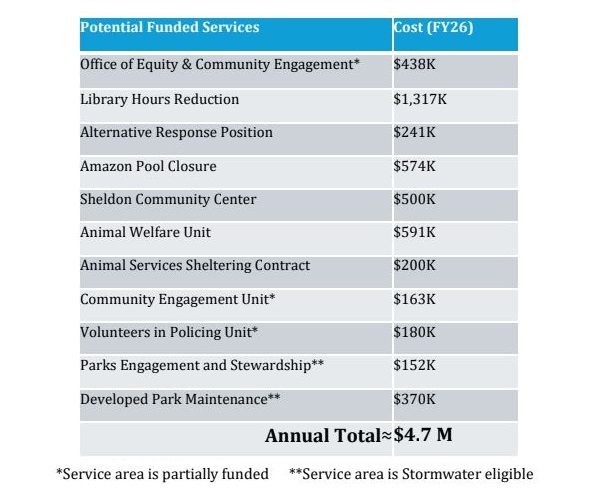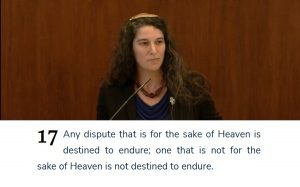City Council approves $4.7M increase to stormwater fee; new revenue could support 11 popular services
8 min read
Presenter: The Eugene City Council approved a six-year stormwater fee May 21 that could appear on your EWEB bill as early as August. On average, a residential customer will pay an additional $3.50 per month. Assistant City Manager Matt Rodrigues:
[00:00:17] Matt Rodrigues (Eugene, assistant city manager): Let’s talk a little bit about the temporary stormwater fee increase option. This is using the existing stormwater fee that we already have in place and taking all of the services that are in the general fund that are stormwater-eligible and moving them into stormwater.
[00:00:35] Basically, that’s Parks services. And there’s about $4.1 million in Parks services that could move into stormwater. That frees up funding if you wanted to use it that way temporarily. We’re going to share a number a little later that says a $4.7 million increase in the stormwater fee and that’s because there’s a couple services that are already stormwater-eligible that were on the reduction list that would add on top of that $4.1 million.
[00:01:01] Again, this is just basically an increase to the current rate, so there’s no change in methodology. It uses the one that’s in place.
[00:01:09] In order to generate $4.7 million, it’s about an 18% increase in the stormwater fee. There’s no additional collection costs because this is already billed on our behalf by EWEB. We already pay them a per-a-bill fee that would not change, because it’s really just a dollar amount going up, not anything else that would be different on their bill.
[00:01:32] Because it’s an administrative process and basically at the point at which we tell EWEB we want to increase the bill, they can immediately do it, this would only take about nine to 10 weeks to implement—just the amount of time it would take us to go through the administrative rate setting process, which means that collection could begin, likely, in August of 2025, which gives you the option to think a little differently about the use of one-time funding, because we wouldn’t have to use very much of that $8 million in reserves that we had saved to bridge to other new revenue options.
[00:02:07] And I’ll channel Twylla Miller, our chief financial officer, when I say that the more of that we can keep in reserves, the better because the economic outlook is uncertain in many ways. So it’s better to keep that in reserves if we can.
[00:02:22] Presenter: Based on the stormwater fee, residents and businesses would pay different rates. Matt Rodrigues:
[00:02:29] Matt Rodrigues (Eugene, assistant city manager): So for medium residential, you’d be at $3.50 a month. For General Service 2, which is that medium-sized supermarket, you’d be at $47 a month and General Service 5, for a big box store, you’d be at $672 a month.
[00:02:47] Presenter: Another factor working against new fees, such as the so-called ‘fire fee,’ or a larger stormwater fee, is that the city would not be able to bill through EWEB. Matt Rodrigues:
[00:02:58] Matt Rodrigues (Eugene, assistant city manager): As you know, there’ve been some ongoing conversations with EWEB about whether or not they might be able to bill a new fee on our behalf. And one thing we learned this week is they have an opinion from their legal counsel that they would not be able to shut off electrical or water service for what would be considered a non-utility fee.
[00:03:19] What that means in practice is that they would have to set up a completely separate billing environment for a new fee within their billing software, which would be a very large investment in time and money, likely taking in the, you know, six- to 10-month range.
[00:03:36] For a fee that has a limited duration, it’s unlikely that would be the direction that would make sense. So when we’re looking at the cost of collection, we’re really looking at using an outside vendor to do that.
[00:03:48] Presenter: Another benefit of the existing stormwater fee is: No additional setup costs. Comparing the existing fee to new fees at differing amounts, City Manager Sarah Medary:
[00:03:59] Sarah Medary (Eugene, city manager): So for an $8 million scenario, the cost of implementing it, you’re getting like 81 cents on the dollar; the $6 million, you’re getting about 75 cents on the dollar; the stormwater, you’re getting a dollar for a dollar, even though it’s a much smaller amount.
[00:04:13] It’s not my favorite to not be bringing forward a budget that has all of the things that you already said you wanted to keep, but it feels like the stormwater scenario is a good scenario.
[00:04:28] Presenter: Council President Greg Evans:
[00:04:31] Councilor Greg Evans: This to me is a short-term compromise. It bridges us over, keeps in place a lot of the critical services that we have been hearing about with, you know, animal services and parks and library and everything else.
[00:04:50] It’s a dollar-for-dollar situation, and it’s coming out of stormwater fees that we’re already billing to people. So we don’t have to set up a separate mechanism to bill it. It’s not going to cost us $1 million plus, as we would if we went through EWEB. And once we conclude this conversation, I’m ready to move forward with a motion to nail this down and get us moving off the dime.
[00:05:21] Presenter: Councilor Alan Zelenka characterized the stormwater fee as ‘kicking the can down the road.’
[00:05:27] Councilor Alan Zelenka: The stormwater fee, it really doesn’t need to sunset. I’m curious why councilors think we should put ourselves in this same exact position four years from now, in kicking the can down the road, basically.
[00:05:41] And what are we going to do in the four to six years where this is in place, if we do it that way, what are we going to do that’s going to not have us be having this conversation at that time or shortly before that time?
[00:05:55] Presenter: Councilor Eliza Kashinsky said she would vote against the fee.
[00:06:00] Councilor Eliza Kashinsky: This does not feel like a compromise. This feels like a capitulation.
[00:06:04] I am overall very frustrated that we are talking about making all of these cuts as part of a compromise without actually having the conversation about the folks in the community who are fine with the fire fee, who want to see these services fully funded.
[00:06:24] A group of people who are saying, ‘No, we don’t want you to move forward with this,’ are able to drive the conversation in a way that hurts a lot of people in our community and I’m very frustrated by that.
[00:06:38] With that said, the long-term goal of all these conversations has been to develop a structurally sound, sustainable budget. The things that we can save with a $4 million fee are the things that have the most clear and direct community impact and community value, and I agree that we need to save those things.
[00:06:56] But when we talk about long-term sustainability, Councilor (Mike) Clark is fond of saying—frequently says— that in order to create a long-term sustainable budget, we need to grow our tax base, grow our economic development, create more housing.
[00:07:11] It feels shortsighted to be cutting programs that are going to help us get to some of that longer-term sustainability. We are looking at problems of how we communicate clearly, and we’re talking about cutting communications staff. We want to talk about sustainability. These options aren’t including some of our sustainability programs.
[00:07:36] I’m willing to pay a little bit more in administrative fees to be able to preserve the things that are going to help us solve this problem in the long term and not just kick the can down the road again.
[00:07:46] Presenter: She pointed out that many of the arguments opponents made about the fire fee also apply to the stormwater fee. Councilor Kashinsky:
[00:07:55] Councilor Eliza Kashinsky: When I think about what community members said they were concerned about the fire fee were, they were frustrated that it was called a fire fee. I understand why it was called a fire fee, but there was a lot of confusion about that name, saying that we were moving stuff around. We’re proposing to increase the stormwater fee. I don’t see how that’s responsive to that concern that the community had.
[00:08:18] There was a lot of concern about administratively raising fees. We’re talking about administratively raising fees 18%. That’s another piece that I think is when we think about what the stated concerns were with the fire fee, this is not a sort of reasonable compromise.
[00:08:39] This is saying we were willing to cut services to avoid and move into short-term solutions to calm down a group that’s being very loud. So. I would not be in support of using the stormwater fee to solve this problem.
[00:08:58] Presenter: After the council agreed that the fee would expire after six years, Mayor Kaarin Knudson:
[00:09:04] Kaarin Knudson (Eugene, mayor): Thank you, and with that we’ll now take a vote for this motion. All in favor? And all opposed? And the motion passes with a vote of 6-2. Thank you, Council.
[00:09:20] Presenter: The second part of the council action May 21 was to discuss a citizen review committee this fall. Councilor Evans:
[00:09:28] Councilor Greg Evans: …And move to direct the city manager to schedule a work session in the fall of 2025 to discuss creating, in accordance with Eugene Code 2.013, an ad hoc citizen fiscal stability advisory committee to review the city’s expenditures, services, and potential revenues.
[00:09:55] Presenter: Mayor Kaarin Knudson:
[00:09:57] Kaarin Knudson (Eugene, mayor): I just want to observe that every conversation we’re having in our community, it’s not just about the budget. It’s about how it is that we are working as a community to meet our whole community’s needs. And that in this next several years we do have several really important conversations about our library levy and the community safety payroll tax, our street bond, our parks and rec levy.
[00:10:19] Those are all coming up and I just wanted to offer that I think that these conversations and these decisions, as you all are moving forward on a path today and trying to establish the stability, it’s also I think important to consider the stability in that process and also understand that we are going to be in continuous conversation with our community about these needs and how we fund them.
[00:10:41] So I just wanted to offer that observation because we have a lot of work, like forever work to do on this front with our community, and every end of conversation is the first sentence of the next one.
[00:10:55] Presenter: The council approves a $4.7 million dollar stormwater fee, and promises to start discussing long-term budget stabilization and a citizen oversight committee after returning from summer break.




